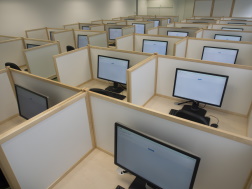Main content
Top content

Research Profile Environmental Economics
Research Profile Environmental Economics
Our research group "Behavioral Economics for the Environment" of the Environmental Economics at the University of Osnabrück (UOS) deals with behavioral aspects of environmental policy.
We are particularly interested in two distinct types of modern policy approaches and their possible combinations: economic incentives, in particular payments for ecosystem services (PES), and cooperative approaches based on self-regulation. These two approaches have developed independently of each other and are based on seemingly contradictory assumptions about what drives human behavior, namely (i) self-interest, which requires material motivations, or (ii) social and environmental preferences that serve as intrinsic motivation for sustainable action. However, individuals are more likely to be driven by a mixture of these motivations and to weigh them differently depending on whether the context is characterized by strong or weak social norms. It is therefore becoming increasingly clear that neither approach is able to effectively address today's environmental challenges on its own.
Moreover, we also analyze the outcomes of specific policies, such as PES, taking into account the findings of certain theories of behavioral economics, psychology and other related disciplines. In our analyses we use tools from experimental economics and game theory.
We study environmental policy in various contexts in developing and industrialized countries. The environmental problems analyzed range from climate protection to biodiversity conservation and water resource management.
At the University of Osnabrück we are part of the Research Center Institute for Environmental Systems Research. The Research Center focusses on changes in environmental systems, resulting problems and their solutions. We understand environmental systems as complex interactions between nature and society. We develop the knowledge base for understanding, evaluating and designing concrete systems. In doing so, we integratively apply a variety of methods from mathematics, computer science, natural, economic and social sciences and develop them further.
Secondly, we are part of the Laboratory for Economic Research (LaER). The research interest of the LaER researchers lies in experimental and theoretical approaches to economics, environmental policy and accounting, with a focus on the development and verification of behavioral theories of economic decision making. LaER promotes the development of microeconomics, environmental economics, economic policy, management, accounting and other academic disciplines as empirical social science.

Professional Associations, Networks and Collaborations
Professional Associations and Networks
- European Association of Environmental and Resource Economists (EAERE)
- International Society of Ecological Economics (ISEE)
- International Association for the Study of Common Property (IASCP)
- Environment for Development (EfD) Initiative
- Verein für Socialpolitik Ausschuss für Ressourcen- und Umweltökonomie (AUROE)
- BioEcon Network (Biodiversity and Economics for Conservation)
- Research Network on Economic Experiments for the Common Agricultural Policy (REECAP)
Collaborations
Among others with
Unit of Environmental Economics, University of Gothenburg; Universidad de Los Andes, Bogota, Colombia; Basque Center for Climate Change, Bilbao, Spain; Montpellier Supagro, Montpellier, France

